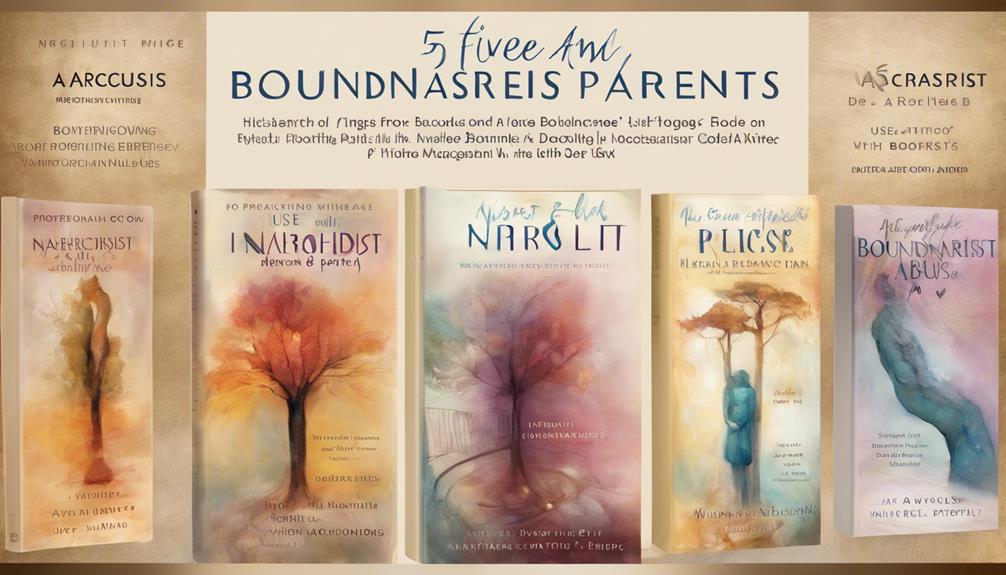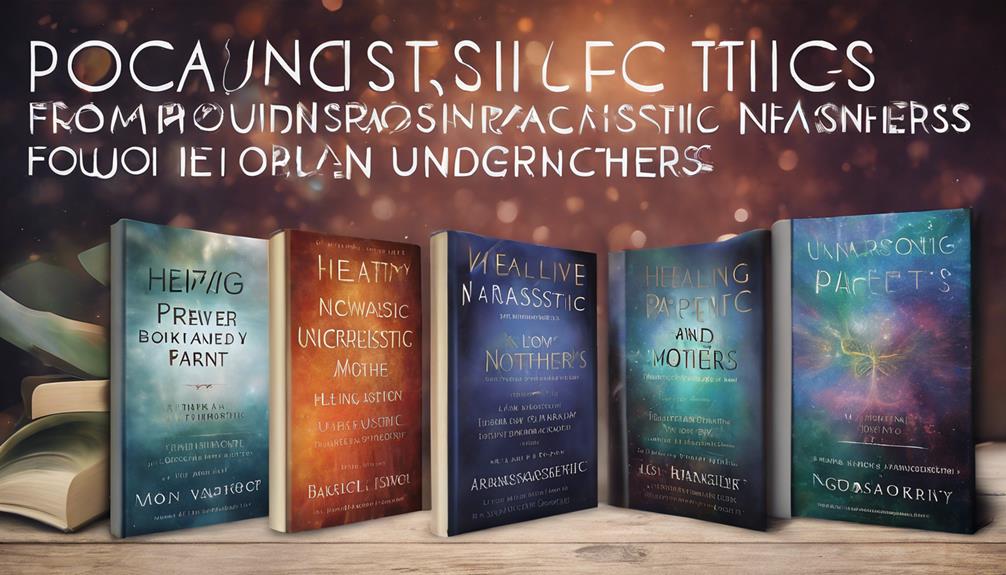As we navigate the maze of narcissistic parenting, it’s like trying to find our way through a thick fog, where clarity seems hard to come by and emotions swirl like a storm.
These top 5 books offer a beacon of understanding and healing, illuminating paths to unravel the complexities of parental narcissism.
By exploring strategies for coping, setting boundaries, and fostering self-care, these resources equip us with tools to navigate the tumultuous waters of narcissistic parent-child relationships.
Let's embark on this journey together towards healing and enlightenment.
Key Takeaways
- Gain profound insights into narcissistic behaviors and their impact on relationships.
- Establish clear boundaries and prioritize self-care for protection and well-being.
- Recognize manipulative tactics and address wounds from emotionally immature parents.
- Seek therapeutic support and validation for healing from the effects of narcissistic parenting.
Essential Books for Understanding Narcissist Parents
When delving into the complex dynamics of narcissist parents, 'Trapped in the Mirror' and 'Children of the Self-Absorbed' emerge as essential reads offering profound insights and guidance. These self-help books delve deep into the emotional repercussions of growing up with narcissistic parents, shedding light on the lasting effects of Childhood Emotional Neglect. By exploring the intricate web of narcissistic behaviors, these books provide a roadmap for understanding how such upbringing can impact one's ability to form healthy relationships in adulthood.
Through the lens of emotional neglect, readers are guided towards recognizing the patterns of behavior instilled by narcissistic parents and are equipped with tools to address and heal from these wounds. The journey to healing involves unraveling the layers of self-doubt and insecurity that may have stemmed from a childhood filled with emotional voids. 'Trapped in the Mirror' and 'Children of the Self-Absorbed' empower individuals to navigate the complexities of their past, offering a path towards self-discovery, growth, and ultimately breaking free from the cycle of narcissistic family dynamics.
Healing Strategies for Narcissistic Parent Relationships

Effective healing strategies for navigating relationships with narcissistic parents encompass establishing clear boundaries, prioritizing self-care practices, and proactively seeking therapeutic support. Understanding the impact of narcissistic parenting on self-esteem, identity formation, and relationships is crucial for healing. Building a support network of friends, therapists, and support groups can aid in coping with the effects of narcissistic parent relationships. Developing self-awareness, self-compassion, and self-validation are key components of healing from narcissistic parent dynamics. Implementing healthy communication patterns, assertiveness skills, and emotional regulation techniques can help in navigating relationships with narcissistic parents.
| Healing Strategies for Narcissistic Parent Relationships | ||
|---|---|---|
| Setting Boundaries | Practicing Self-Care | Seeking Therapy |
| Establish clear boundaries to protect oneself. | Prioritize activities that promote well-being. | Professional guidance can aid in emotional healing. |
| Understanding Impact | Building Support Network | Developing Self-Awareness |
| Recognize how narcissistic parenting affects self-esteem. | Surround yourself with understanding individuals. | Cultivate a deeper understanding of personal emotions. |
| Self-Compassion | Communication Skills | Emotional Regulation |
| Be kind to yourself throughout the healing process. | Learn to express needs and concerns effectively. | Practice techniques to manage intense emotions. |
Insights Into Coping With Narcissistic Parents
Navigating relationships with narcissistic parents requires a deep understanding of the impact of their behavior on emotional well-being and the development of coping strategies to protect oneself.
Growing up under the influence of narcissistic parents can leave adult children of toxic environments feeling empty, like they're running on empty without a guide to getting back on track.
Coping with narcissistic abuse involves addressing the wounds inflicted on the inner child, often neglected and wounded by the behaviors of emotionally immature parents.
Books like 'Children of Emotionally Immature Parents' offer insights and practical tools to help you heal from the effects of narcissistic parenting. These resources can provide validation, support, and empowerment as you navigate the challenging path of setting boundaries, seeking therapy, and practicing self-care in interactions with narcissistic parents.
Boundaries and Self-Care With Narcissist Parents

Establishing firm boundaries and prioritizing self-care are essential strategies for safeguarding our emotional well-being when dealing with narcissist parents. It's crucial to protect our mental health and assert our needs in these challenging relationships.
Here are four key steps to help navigate boundaries and self-care with narcissist parents:
- Recognize Manipulative Tactics: Understanding the manipulative tactics and gaslighting behavior used by narcissist parents is vital in setting boundaries and maintaining a sense of reality.
- Practice Assertiveness: Learning to say no and assert our needs is empowering when faced with parents who often disregard our feelings and prioritize their own desires.
- Seek Support: Engaging with a therapist, joining a support group, or confiding in trusted friends can offer validation and guidance as we navigate the complexities of managing relationships with narcissist parents.
- Prioritize Self-Care: Engage in self-care practices such as mindfulness, therapy, and journaling to prioritize our mental health and well-being amidst challenging interactions with narcissist parents.
Tools for Healing From Narcissist Parents
Understanding the impact of narcissist parents and seeking healing tools is a crucial step towards reclaiming our emotional well-being and breaking free from toxic cycles. Daughters of Narcissistic Mothers and adult children of toxic parents often face emotional neglect, requiring specific tools for healing and empowerment. Self-help books like 'Trapped in the Mirror' offer insights into the struggles of adult children of narcissists and guidance on healing from trauma. 'Children of the Self-Absorbed' explores the impact of narcissistic parents on adult relationships, providing strategies for healing. Additionally, 'Running on Empty' delves into the effects of emotional neglect from narcissistic parents, offering a step-by-step plan for emotional recharge. Furthermore, 'Will I Ever Be Good Enough' empowers daughters of narcissistic mothers to heal, grow, and break old patterns. These resources validate experiences, foster understanding, and provide actionable steps towards healing and breaking free from the cycle of toxicity.
| Healing Tools for Narcissist Parents | Benefits |
|---|---|
| 'Trapped in the Mirror' | Insights into struggles and trauma healing |
| 'Children of the Self-Absorbed' | Strategies for healing in adult relationships |
| 'Running on Empty' | Step-by-step plan for emotional recharge |
| 'Will I Ever Be Good Enough' | Empowerment for daughters of narcissistic mothers |
Frequently Asked Questions
How Do You Recover From a Narcissistic Parent?
Recovering from a narcissistic parent involves acknowledging the impact of emotional abuse on our self-worth, setting boundaries, seeking therapy, and prioritizing self-care. Understanding that their behavior isn't a reflection of our value is crucial.
What Is the Book About the Child of a Narcissistic Parent?
When living under a narcissistic parent's shadow, the book delves deeply into the tumultuous emotional journey we endure. It uncovers the roots of our struggles, revealing how parental behavior shapes our sense of self.
Through poignant stories and practical advice, it guides us towards healing and self-discovery. We learn to set boundaries, prioritize self-care, and break free from the toxic cycle.
This book provides a beacon of hope for those navigating the challenging terrain of narcissistic parenting.
How Do I Teach My Child to Deal With a Narcissistic Parent?
We teach our child to deal with a narcissistic parent by educating them about healthy boundaries and how to assert them respectfully. We encourage them to express their feelings openly, providing consistent emotional support. Modeling self-care practices and seeking therapy equip them with coping skills.
It's vital to create a safe space for their emotions to thrive and help them develop resilience. Ultimately, our aim is to empower them in navigating the complexities of having a narcissistic parent.
How Does a Narcissist Daughter Treat Her Mother?
Dealing with a narcissist daughter's treatment towards her mother can be incredibly challenging. She may exhibit manipulation, gaslighting, and emotional abuse to maintain control. Traits of entitlement, lack of empathy, and constant need for admiration are common.
Communication can be difficult, with the daughter seeking validation and displaying controlling behaviors. Understanding these dynamics can aid in setting boundaries, seeking support, and healing from the emotional toll of such a relationship.
– What Makes These Books the Best for Understanding and Healing from Narcissist Parents?
If you’re searching for guidance on dealing with narcissist parents, look no further than these top narcissist parent books. They offer valuable insights, practical strategies, and real-life stories to help you understand and heal from the effects of growing up with narcissistic parents.
Conclusion
As we close the pages of these insightful books on healing from narcissist parents, we're reminded of the tangled roots that shape our relationships.
Like a delicate tapestry unraveling, we now hold the threads of understanding and healing in our hands.
Let's weave a new narrative of self-love and resilience, using the tools and insights gained to create a brighter future free from the shadows of narcissistic upbringing.









